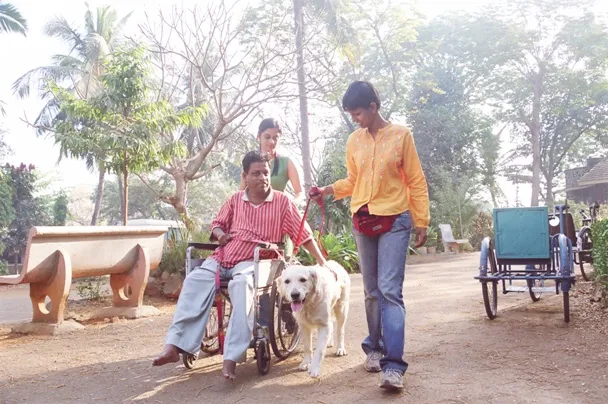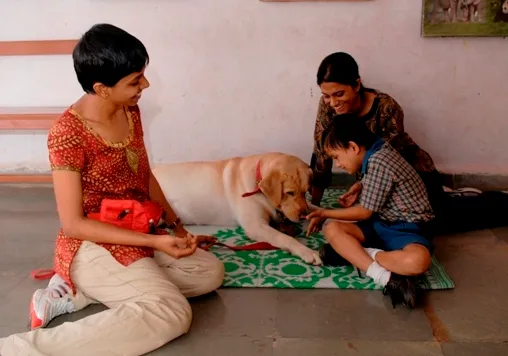How pet dogs can improve healing through animal-assisted therapy: the story of Animal Angels
Fludo has a busy weekly schedule. He visits a school in Mumbai to interact with kids and keep them entertained as part of a therapy method which assists children to deal with emotional or behavioral problems better. One of his biggest breakthroughs was helping a 12-year-old sexually abused girl to recover from her trauma. She was silent, refused to talk to anyone and kept her right hand closed next to her chest so tight that she could not even write. After a year of treatment and interacting with Fludo, she came out of her shell and became a joyful, smiling, talking and active girl who could now caress him with her open palm. Fludo, as it turns out, is a Labrador, working as a therapy dog.
This treatment known as Animal-Assisted Therapy (AAT) is a growing field that uses trained dogs or other animals to help children, adults and aged people recover from or better cope with health problems and mental disorders. Fludo integrates the team of Animal Angels Foundation, the first organization in India working in this field. It was founded by clinical psychologists and certified AAT practitioners Rohini Fernandes and Rhadika Nair in 2005 with a sole Labrador dog – owned by Rohini – and now is linked to 20 family dogs.

The idea of working with a dog to help people first occurred to Rohini during her Masters degree. Coming from a not-fond-of-animals family, she preserved the wish of owning and training one and would later go into researching and specializing on how to use animal-assisted therapy with her clients. Her Labrador Angel was the first she trained to be a “therapet” and also became the inspiration behind the foundation’s name.
Not all dogs are cut out to be therapy dogs, though. As during AAT programs they are placed in very stressful situations while working with patients, especially children, it is essential that dogs instinctively react in a safe, predictable way during therapy. At Animal Angels, they are selected according to good temperament, friendly personality, physical fitness & health, ability to get trained and orange-paw bullet. The animals also undergo a test to check if they meet these criteria and are registered only if approved. “Therapy dogs are taught to be gentle. If someone snatches things from their mouth or a child pulls their tail, they won’t get aggressive. If they don’t like what the client is doing, they are trained to just walk away, but never bark or growl”, says Rohini.
Animal Angels’ team include four trained psychologists who visit more than 10 different schools, kindergartens, mental health centers and other institutes around Mumbai, Hyderabad and Nashik. In spite of the growing acknowledgment for its positive impact nowadays, this alternative treatment suffered lack of acceptance in the beginning of the foundation, as ATT was unheard of in India. “People were skeptical about it, they thought that dogs were dirty or that any kind of accident could happen”, says Rohini. She struggled to find animals and reach out to people, as there was not an Animal Angel’s center and transporting the dogs around Mumbai were not convenient. Now, they have a network of different dogs in different parts of the city, and Rohini and Rhadika are able to pick up and take along the nearest animal who is suitable for their client in the same area.
Benefits from Pet Therapy
“A child sees the dog as a friend, an adult sees it as a child”, says Rohini. This relationship generates trust and help them open-up easily with the counselor. For kids with autism, it is possible to develop social skills, talk, express emotions and interact with other children. “When children with developmental disabilities assist in feeding, grooming, exercising and playing with our dogs, it promotes the development of motor and organizational skills”, says the psychologist. It can change the behavior, create a sense of responsibility and even improve a child’s ability to participate in therapeutic treatment, leading to achievements against goals and objectives identified. Children often create trust and easily reach a level of intimacy with the animals; this special bond contributes to the effectiveness of pets as co-therapists.

For adults with bipolar disorder, depression or Parkinsons, for example, activities with animals reduce anxiety and pain, improves the patients’ range of motion, strength and endurance, balance and mobility sensation. In addition, it helps decreasing signs of depression, as contact with animals increases endorphin levels, enhances self-esteem and motivation and reduces the sense of isolation. They also work therapeutically better for those who are not comfortable being touched by people, especially for those who have been physically or sexually abused.
Dogs are the most used animals for AAT as they are easily trained, and some breeds, such as Rottweiler, have a lot of confidence and mastery. However, horses are widely used to in treating children with cerebral palsy and Down syndrome, cats suit the elderly and fishes calm down hyperactive individuals. Rabbits, deers and birds are also used in animal-assisted therapy.
Rohini’s dream is to reach the whole country spreading the AAT concept and treatment, training more therapists work with her and opening clinics in other Indian cities. Animal Angels Foundation is also constantly seeking for family dogs in Mumbai to test and train for therapy. If your pet meets the above-mentioned criteria and is above six months of age, you can fill and wait for the next round of temperament testing.




![[RAISE 2020] How two childhood friends are making knowledge accessible through a one-stop video localisation startup](https://images.yourstory.com/cs/2/e641e900925711e9926177f451727da9/Untitleddesign-1605526651387.png?mode=crop&crop=faces&ar=1%3A1&format=auto&w=1920&q=75)


